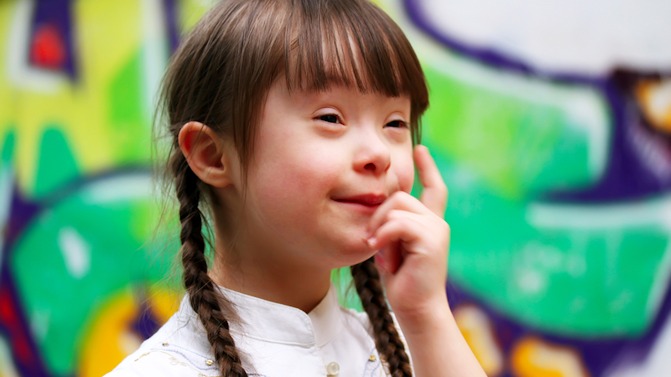There are a lot of misconceptions surrounding Down syndrome, and disability in general. But the truth is that people with Down syndrome are people first, just like anyone else, and they are not defined by their disability. They are people who learn, and love; who lead fulfilling lives, have unique personalities, and contribute to society in their own individual ways. Yet people insist on spreading stereotypes, without realizing how hurtful those stereotypes are.
A new video from BBC Three, titled “Things People With Down’s Syndrome Are Tired of Hearing,” tackles this issue. In the video, Down syndrome self-advocates, along with family members, discuss things people say that they hate, with a lot of humor and wisdom. Appearing in the video are Bekki and Bethany Asher, a mother and daughter; Heidi Crowter, Sarah Gordy, Claire Minett, Sara Pickard, and Tommy Jessop, who all have Down syndrome; and Laura Burgess, whose daughter Bella has Down syndrome.
People with Down’s syndrome can’t have relationships
People with Down syndrome can, and do, have relationships. They have romantic relationships, strong friendships, and loving relationships with family members. People with Down syndrome date and get married. As Tommy said, “Kissing is my favorite pastime.” Because Down syndrome can come with cognitive delays, some seem to want to deprive people with Down syndrome of the ability to have romance in their lives. And yet, “I’m so romantic!” Bethany, another girl in the video, added.
People with Down’s syndrome can’t learn
This is ignorance at its finest. It does often take people with Down syndrome longer to do things, due to their developmental delays. But it doesn’t mean that they can’t learn. They can, and do. “Maybe sometimes they might need a little bit of a push,” Sara said. “I passed all 10 of my GCSEs.” Laura added, “You know, ‘Will she be able to do this? Will she be able to do that?’ I say, ‘Yeah, she’ll be able to do everything, it’s just we’ll take the scenic route.'”
Adults with Down’s syndrome are like children
Infantilization of people with Down syndrome is sadly common. Instead of treating them as they are — a child, a teenager, an adult — people will often treat them as if they are babies in larger bodies. This isn’t just an incorrect assumption, it’s condescending and rude. “Yes, it’s patronising,” said Claire, after she was asked if people talk to her like she’s a child. “Some people do the head tilt as well.” Imagine if every time someone talked to you, they talked down to you, instead of treating you like you were an equal. That would get old pretty fast.
Down’s syndrome is a disease
On virtually any news story about Down syndrome, there’s a good chance you’ll see the phrase “Down syndrome sufferer,” or refer to a person as “suffering from Down syndrome.” Except, news flash: Down syndrome is not a disease, and people who have it aren’t suffering. It’s just an extra chromosome! “We bring something different to the world that other people can’t,” Claire said. “The only thing I suffer from is bad attitudes,” Sara added.
Those with Down’s syndrome can’t live independently
People tend to think that a person with Down syndrome will either have to live with their parents forever, or in an institution. But people with Down syndrome can and do live on their own. “Of course they can, because I live independently,” said Heidi. There’s no reason that people with Down syndrome have to live with their parents or in a home, and many people do, indeed, choose to live on their own.
Those with Down’s syndrome can’t have jobs
This may be connected to the infantilization of people with Down syndrome; if you can’t look at a person with Down syndrome as an adult, then naturally, you won’t be able to imagine them holding jobs. But people with Down syndrome work and contribute to society, just as people without Down syndrome do. “I work in a hair salon, and I love it,” said Heidi. “I went through retail, office work, went back to retail, then went back to office work, and then media,” Claire added. The only limitations on people with Down syndrome are the limitations put onto them by society.
The video concludes not with a commonly-used phrase, but a few questions:
What do you think about testing for Down’s syndrome?
This is a contentious issue, even in the Down syndrome community. But one thing these self-advocates all agreed upon was that testing for Down syndrome to aid in abortions was not acceptable. “It’s quite upsetting to hear about something like that,” Bethany said. “Babies with Down’s syndrome can be aborted at 40 weeks, whereas a baby without Down’s syndrome obviously the cut-off point is 24 weeks, so I think there’s an ethical question there,” Laura added. People with Down syndrome don’t feel that they are suffering, or that their lives aren’t worth living — and they don’t want to be targeted for extermination.
Do you wish you didn’t have Down’s syndrome?
People who aren’t informed about Down syndrome might assume that the answer would be yes. But remember, Down syndrome isn’t something that people suffer from or that needs to be eradicated. “No. Why? It’s just me, it’s part of me,” said Claire. Sara agreed saying, “I may have Down’s syndrome, but without it, I don’t think I’d really be me.” But perhaps the best response came from Heidi, who explained, “I don’t wish that; I wish that people will see Down’s syndrome in a positive light.”







